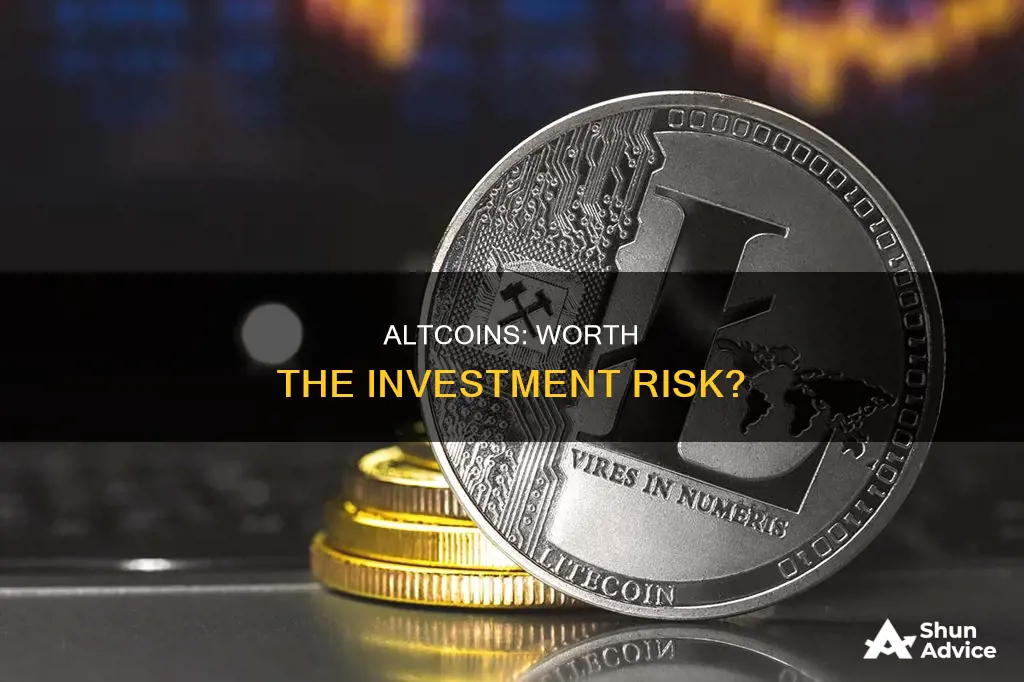
Investing in altcoins is a risky business. Altcoins are any cryptocurrency that isn't Bitcoin and, while they can offer a high upside in terms of percentage gains, they also come with a much higher risk attached.
Altcoins are incredibly volatile and, in many cases, difficult to regulate. There is also little regulation in place around them. For example, when companies want to sell shares of stock to the public, they must first register their IPOs with the Securities and Exchange Commission (SEC). Cryptocurrency coin offerings, on the other hand, do not have to be registered with the SEC.
However, altcoins can also be a source of diversification for more traditional portfolios, but this diversification must be handled with great care. It's important to do your research and only invest money you can afford to lose.
| Characteristics | Values |
|---|---|
| Definition | Alternative coins to Bitcoin |
| Number of Altcoins | Over 5,000 |
| Market Capitalization | Nearly 40% of the total cryptocurrency market |
| Volatility | Very high |
| Risk | Very high |
| Regulation | Little regulation in place |
| Investment Strategy | Diversification, long-term investment |
| Investment Research | Research the team behind the altcoin, its problem-solving capabilities, and the community |
| Taxes | Treated as property with capital gains or losses |
What You'll Learn

Altcoins are alternatives to Bitcoin but are riskier investments
There are more than 5,000 altcoins, according to CoinMarketCap, and they make up nearly 40% of the total cryptocurrency market. Altcoins are any cryptocurrencies that aren't Bitcoin (BTC). They were created after Bitcoin and often present themselves as better alternatives to the premier cryptocurrency.
While there are many promising altcoins out there, most of them will never be able to materialize into anything useful or provide substantial returns in the long term. That said, altcoins offer the opportunity for a much higher upside in terms of percentage gain. For example, while Bitcoin tripled its value recently, many altcoins explode 30, 40 or 50 times over within days.
However, altcoins are incredibly risky investments. They are extremely volatile, and there is little regulation in place around them. Fraud is also rampant in the cryptocurrency market, with scammers who lure investors with fake cryptocurrencies.
If you are considering investing in altcoins, it is important to do your research and understand the risks. Ask yourself questions such as: Who is behind the altcoin and do they have a track record of success? Does the altcoin solve a real problem in a novel way? Is there a real community developing around the altcoin?
Remember, investing in cryptocurrencies involves high levels of risk due to the market’s immense volatility.
Big Money on Bitcoin: Investment Firms' Take
You may want to see also

Altcoins are any cryptocurrency that isn't Bitcoin
Altcoins were created after Bitcoin and are often marketed as better alternatives to Bitcoin. They are designed and released by developers with different visions and uses for their tokens. Most altcoins aim to improve upon the perceived limitations of Bitcoin, such as transaction speed and energy efficiency.
Some examples of altcoins include:
- Ethereum (ETH) - the second-largest cryptocurrency by market capitalization, designed as a decentralized computing platform
- Tether (USDT) - one of the first stablecoins, which aims to reduce volatility by pegging its value to the US dollar
- Dogecoin (DOGE) - a "memecoin" that started as a joke based on a "doge" meme, but has since gained widespread popularity and is accepted by some major companies as a form of payment
- Binance Coin (BNB) - a utility cryptocurrency that serves as a payment method for fees on the Binance Exchange
Investing in altcoins can be risky due to the lack of regulation and the high volatility of cryptocurrency prices. It is important to do thorough research before investing in any altcoin, understanding the team behind it, its unique value proposition, and the potential risks involved.
Bitcoin Investment: Good or Bad Idea?
You may want to see also

Altcoins are incredibly volatile
Altcoins are alternatives to Bitcoin, but they are even riskier investments. They are incredibly volatile, and most individual investors are not equipped to manage this volatility. Altcoin prices can explode 30, 40 or 50 times over within days, but they can also fall out of favour just as quickly as they rise.
Take the example of Dogecoin, which took off in value in late January 2021 when people started buying it, causing the altcoin to go viral. However, such investments can fall out of favour as quickly as they rise.
Another example is DeTrade, a cryptocurrency that seemed safe as its development team could be found on LinkedIn, and its CEO laid out a roadmap for the coin's future. However, this was all a scam, and the people behind it vanished with around $2 million.
Altcoins are also prone to scams and fraud. For instance, OneCoin stole $4 billion from people worldwide through a presale for a cryptocurrency that didn't exist before its founder disappeared. BitConnect, a coin that reached a $2.6 billion valuation, was designated a Ponzi scheme and lost 96% of its value before being shut down.
Altcoins are also difficult to regulate and subsisting largely on hype. They are also prone to "rug pulls", where coins are suddenly discontinued and owners take all the money.
Therefore, it is crucial to do your research before investing in altcoins and only invest money you can afford to lose.
US Mint Coins: Which Are Worth Your Investment?
You may want to see also

Altcoins are unregulated
The unregulated nature of altcoins also means that sophisticated trading desks are often not allowed to participate in trading them due to corporate guidelines and compliance issues. This results in inefficient crypto markets where price discovery can take a long time. For example, it took over 2.5 years for people to realise that LUNA was a worthless fraud, despite warnings from sophisticated investors.
The lack of regulation also means that altcoins are not suitable for the typical retail investor. As SEC Chairman Jay Clayton stated in 2017, invested funds may quickly travel overseas without your knowledge, and it may be difficult for market regulators to pursue bad actors or recover funds.
While some initial coin offerings (ICOs) are securities that fall under the jurisdiction of the SEC, many are not. Even those that do fall under SEC regulation can still pose a significant risk of fraud.
Therefore, it is crucial for investors to do their due diligence and thoroughly research the people behind an altcoin, its value proposition, and the protections in place before investing.
Litecoin vs. Bitcoin: Which Crypto is the Better Investment?
You may want to see also

Altcoins offer diversification
Diversification is a key strategy in investment management, helping investors mitigate the volatility associated with digital assets. It involves spreading investments across different assets to minimise risk and maximise returns.
Altcoins are an excellent tool for diversification. Firstly, they provide access to niche markets and industries with specific use cases, such as privacy, scalability, interoperability, and governance, which are not adequately addressed by Bitcoin and Ethereum. For example, privacy-focused altcoins like Monero and Zcash have gained popularity among users who prioritise anonymity and security.
Secondly, altcoins offer exposure to innovative projects and new technologies, which is critical for crypto investors to stay ahead of the curve in the fast-evolving crypto market. By investing in these altcoins, investors can potentially reap substantial returns if these projects succeed.
Thirdly, altcoins have the potential for high returns due to their lower market capitalisation and volatility. They can experience rapid price swings, which can be beneficial for crypto investors seeking substantial gains.
Finally, diversification within the altcoin sector itself is important. Investors can spread their investment across altcoins with different use cases or blockchain networks, such as those focused on payment processing, privacy, or smart contract technology. This reduces the risk of exposure to any particular sector.
However, it is important to note that altcoins are incredibly risky investments. They are highly volatile, with prices fluctuating rapidly and unpredictably. There is also a lack of regulation in the altcoin market, leaving investors vulnerable to fraud, hacking, and market manipulation.
Therefore, while altcoins offer diversification benefits, investors must carefully consider their risk tolerance and conduct thorough research before investing in this space.
Invest in Bitcoin: Avoid Startup Fees and Get Started
You may want to see also







